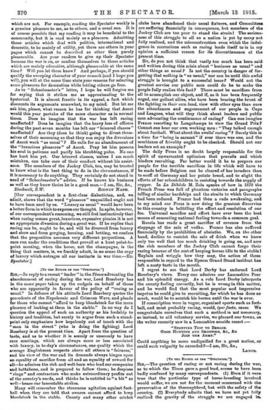[To Too Symms or ros . Srscrorosl
Siz,—In reply to a recent" leader" in the Times advocating the abandonment of racing during the war, Lord Rosebery has in the same paper taken up the cudgels on behalf of those who are apparently in favour of the policy of "racing as usual" In defence of his attitude Lord Roaebery quotes the precedents of the Napoleonic and Crimean Wars, and pleads for those who cannot "afford to keep bloodatock for the mere pleasure of looking at them in the stable." In no way do I question the appeal of such an authority as his lordship to history and tradition, but surely to argue from such a stand- point only emphasizes how hopelessly out of touch with the "'man in the street" (who is doing the fighting) Lord Rosebery is at the present time. Apart from the question of taste, and as to whether it is seemly or unseemly to have race meetings, which are always more or lees associated with luxury, in to-day's circumstances, one quality which the average Englishman respects above all others is "fairness," and his view of the war and its demands always hinges upon an equality of sacrifice from all and an equality of reward for all—be admires the rich and well-born who lead our companies and battalions, and is prepared to follow them; he despises rings " and contractor's who make extraordinary profits out of the country's needs, and thinks he is entitled to ° a bit* as well—hence our lamentable strike..
Many will remember the strenuous agitation against foot- ball when they are told that owners cannot afford to keep Iloodeteek in the stable. County and many other cricket clubs have abandoned their usual fixtures, and Committees are suffering financially in consequence, but members of the Jockey Club are too poor to stand the strain! The serious- ness of this struggle to all as a nation is yet by many not frilly realized, and the misconstruction even which the indul- gence in recreations such as racing lends itself to is in nip opinion a sufficient reason for its discontisuance at the present time.
Sir, do you not think that vastly too much has been said and written during this crisis about" business as usual" and other things as usual ? Is not the country in danger of for- getting that nothing is "as usual," nor can be until this awful straggle is brought to a successful issue? Would not the greatest service our public men could do be to make the people fully realize this fact? Them must be sacrifices from all to accomplish our object, and if, as it has been frequently urged, our gallant allies, who have been bearing the brunt of the fighting in their own land, view with other eyes than ours the attendances and engrossment of our people in Cups and Leagues, what will they think about leaders and public; men advocating the continuance of racing? Can one imagine France resorting to Longchamps to view the Grand Prix P Cannot one hear our own working men: "They talked enough about football. What about the swells' racing"? Surely this is a time for "being in earnest" if ever there was one, and the semblance of frivolity ought to be checked. Should not our leaders set an example ?
The daily Press is no doubt largely responsible for the spirit of unwarranted optimism that prevails and which hinders recruiting. Far better would it be to prepare our people for the terrible sacrifices in life which will have to be made before Belgium can be cleared of her invaders than to scoff at Germany and her potato bread, and to slight the efforts of her schoolchildren in assisting towards the supply of copper. In La Debticle M. Zola speaks of how in 1870 the French Press was fall of phantom victories and paragraphs telling of similar hardships and the straits to which Germany bad been reduced. France had then a rude awakening, and to my mind our Press is now doing the greatest disservice to this country in belittling the effort and resolution of our foe. Universal sacrifice and effort have ever been the best means of cementing national feeling towards a common goal.
Russia has made a great sacrifice of revenue from the stoppage of the sale of vodka. Franco has also suffered financially by the prohibition of absinthe. We. on the other hand, decline to restrict the sale of drink when we know only too well that too much drinking is going on, and now the rich members of the Jockey Club cannot forgo their racing because of the coat of keeping horses idle in the stable I Explain and wriggle how they may, the action of those responsible in regard to the Epsom Grand Stand incident has left a nasty taste in the month.
I regret to see that Lord Derby has endorsed Lord Rosebery's views. Every one admires our Lancashire Peer and his splendid energy. As a rule Lord Derby interprets the county feeling correctly, but he is wrong in this matter, and he would find that the most popular and impressive impetus be could give to recruiting, for which be has done so much, would be to scratch his horses nntil the war is over.
If conscription were in vogue, organized sports such as foot- ball, and most probably racing, would, ipso facto. cease We congratulate ourselves that such a method is not necessary, no instead, to aid voluntary service, we placard our towns, an the writer recently saw in a Lancashire seaside resort " SPORTING TRIP TO ERMAN.
GOOD RUSTING ARD SHOOTTRO, Ac, &a
Jens THR Amer."
Could anything be more undignified far a great nation, or could such vulgarity be exceeded P—I am, Sir, &a.,
Lancs.


































 Previous page
Previous page